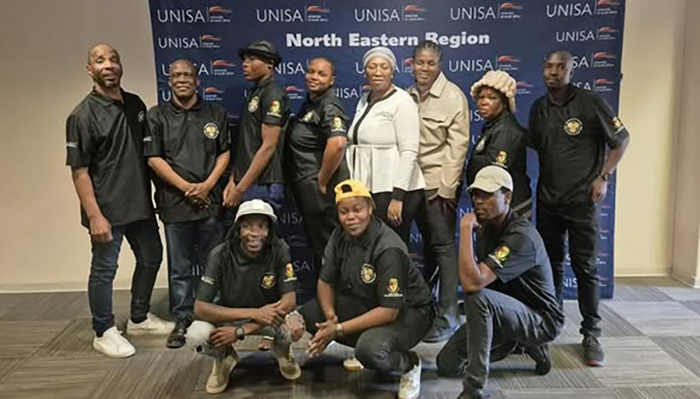

Displaying the Afrikaans and isiXhosa Brochures is Wilhelmina Zaal, Acting Branch Librarian: Unisa Cape Town Branch Library
After attending the multilingual language policy implementation workshops in 2024, presented by the Directorate of Language Services (DLS), librarians at the Unisa Cape Town Branch Library began actively seeking new ways to incorporate multilingualism into their services.
Traditionally, the library information brochures have been available in English only. The librarians subsequently decided to request translations of these items into Afrikaans and isiXhosa from the DLS. The translations were received and have been available to students since the start of 2025.
The library then noted it was receiving numerous new books from the Main Unisa Library that were in indigenous languages. These books would usually be shelved under their Dewey decimal number and be absorbed into the collection. These shelves are located in a corner of the library, which few students visit.
Silindile Ngubane, Library Intern: Unisa Cape Town Branch Library, in the area housing the Indigenous Language Collection
Instead of allowing this to happen, a separate display has been created adjacent to the circulation desk to inform students and staff about the collection. The library currently has books in the following languages: Siswati, Sepedi, Sesotho, Xitsonga, IsiNdebele, IsiZulu, Setswana, Tshivenda and isiXhosa. These books are available to students and staff to borrow. For online awareness, a new tab was created on the Unisa Cape Town Branch Library LibGuide with links to the latest books.
Moving into 2026, librarians will request that DLS translate surveys used to gather information from students into isiXhosa and Afrikaans. Signage outside the library already includes English, isiXhosa and Afrikaans. In 2026, the signage inside the library will also be displayed in these three languages. The Unisa Cape Town Branch Library remains committed to the university's vision and will continue to explore new ways to promote multilingualism.
* By Michelle Biederman, Library Assistant: Unisa Cape Town Branch Library
Publish date: 2025/12/12